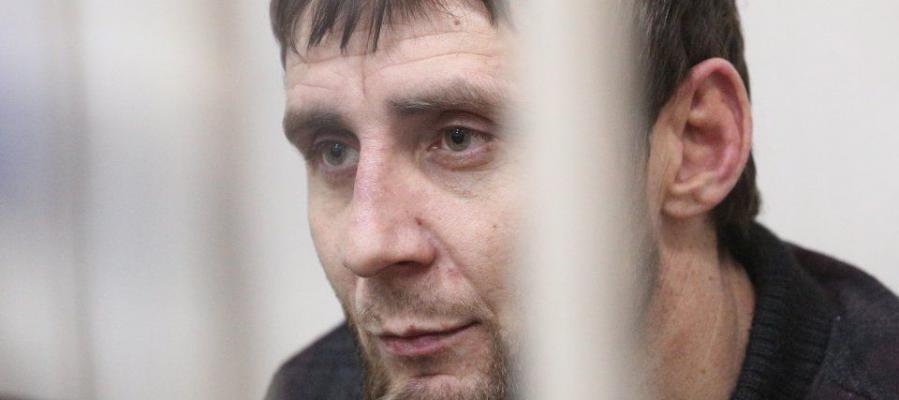
The European Court of Human Rights posed questions to the Russian authorities concerning the application of Zaur Dadayev – one of the convicted in the case of Boris Nemtsov’s assassination in 2015. Dadayev informed that after apprehension he was subjected to brutal tortures, however, the Investigative Committee did not check this application in the appropriate way.
As we have previously reported, in March 2015 Zaur Dadayev applied to the Public Monitoring Committee of Moscow. He told the Committee members that on 5 March he was apprehended by unidentified persons in Magas town of the Republic of Ingushetia. According to Dadayev, his friend was apprehended together with him. Both men were taken to the cellar, Dadayev was kept for three days, and his mate – for two days. According to Dadayev, for three days he was with a bag on his head, he was not fed, and only several times he was given a drop of water, without removing the bag from his head, he was also tortured with electricity when forced to confess of Boris Nemtsov’s assassination. As a result, on 7 March 2015 he signed a confession in the department for major crimes of the Chief Investigative Directorate of the Investigative Committee of Russia for Moscow.
Nevertheless, the investigative authorities were not, apparently, very interested in information on tortures. That is why, on 4 April 2015, lawyers with the Committee Against Torture, where Dadayev applied to, submitted a crime report to the Investigative Committee, however, the check was not performed appropriately.
In essence, the refusal to initiate a criminal case on torture was grounded on verbal evidence of the law-enforcement bodies, which, certainly, denied any illegal actions from their side. The investigative authorities did not take any attempts either to confirm or disprove the presence of electrical impact on Dadayev’s body, despite the motions of human rights defenders. The investigator did not even fully question the applicant himself, because previously, his colleague, investigating the criminal case on Boris Nemtsov’s assassination, prohibited Dadayev’s defense lawyer Evgeny Gubin from accessing his client at the Pre-Trial Detention Facility, and without a defense lawyer the questioning turned out to be incomplete.
As we have previously reported, the investigator who prohibited access of defense lawyer Gubin to Dadayev, was Igor Krasnov, who takes a position of the General Prosecutor of Russia since January 2020. Attempts to appeal against the obvious illegality of this prohibition in Russian courts ended in vain.
“I think that Zaur Dadayev’s story is a bright example of the fact that investigation is not always independent in Russia, and very often instead of conducting an investigation in accordance with the law, it simply tailors its conclusions in accordance with the result previously indicated by their superiors, – lawyer with the Committee Against Torture Anastasia Garina comments. – There is an impression that the instruction was to solve one crime by any means (in this case, assassination) and do everything to sweep under the carpet the other crime (in this case, tortures). What this activity has to do with the rule of law? Nothing whatsoever”.
In February 2016, lawyers with the Committee Against Torture submitted an application to the European Court of Human Rights with an indication of violation of Zaur Dadayev’s rights not to be subjected to torture, rights to effective investigation and rights to have a defense lawyer chosen by him.
In parallel, defense lawyer Rosa Magomedova submitted an application to the European Court stating that the conditions of Dadayev’s keeping in custody at the investigative cell, buildings of the court, as well as the conditions of his transportation were not satisfactory; she also pointed out the excessive duration of the preliminary confinement and its repeated unmotivated extensions. The defense lawyer also pointed out that the applicant could not effectively participate in the court hearing due to his confinement in the glass cabin and metal cage during the hearings and the highly intense schedule of this hearings, as well as inhumane conditions of his transportation to the court building and back. Finally, the application pointed out at violation of Article 6 of the European Convention of Human Rights (hereinafter – the Convention), guaranteeing the right to fair trial, with regard to the fact that during the trial the judge accepted the evidence and read to the jury the confession, which, according to Dadayev, was forced by tortures.
Subsequently, all these complaints were joined in one, and on 7 July 2020 it was communicated to the Russian authorities. Today, 27 July 2020, information about it appeared on the website of the European Court. Namely, the Court posed the following questions to the country’s authorities:
– was Dadayev from 5 to 7 March 2015 subjected to torture, inhumane or degrading treatment;
– was the effective investigation of the applicant’s claims of tortures performed (it is proposed that the Russian Government provided a full dossier of the investigation with regard to the events happened in the period from 5 to 7 March 2015);
– were the conditions of Dadayev’s keeping in custody, as well as his transportation to the building of the court and back acceptable in accordance with Article 3 of the Convention;
– did Dadayev have an effective domestic remedy available, as it is required by Article 13 of the Convention;
– was the preliminary confinement of the applicant grounded and was the period of his keeping in custody reasonable in accordance with item 3 of Article 5 of the Convention;
– was the right of the applicant to keep silent respected, bearing in mind the fact that the confessions provided by the applicant on 7 and 8 March 2015, were disclosed to the jury, and was the applicant provided with sufficient time and means for preparing his defense and keeping his communication with the defense lawyer confidential, when the applicant was in the glass cabin and a metal cage in the course of judicial proceedings.